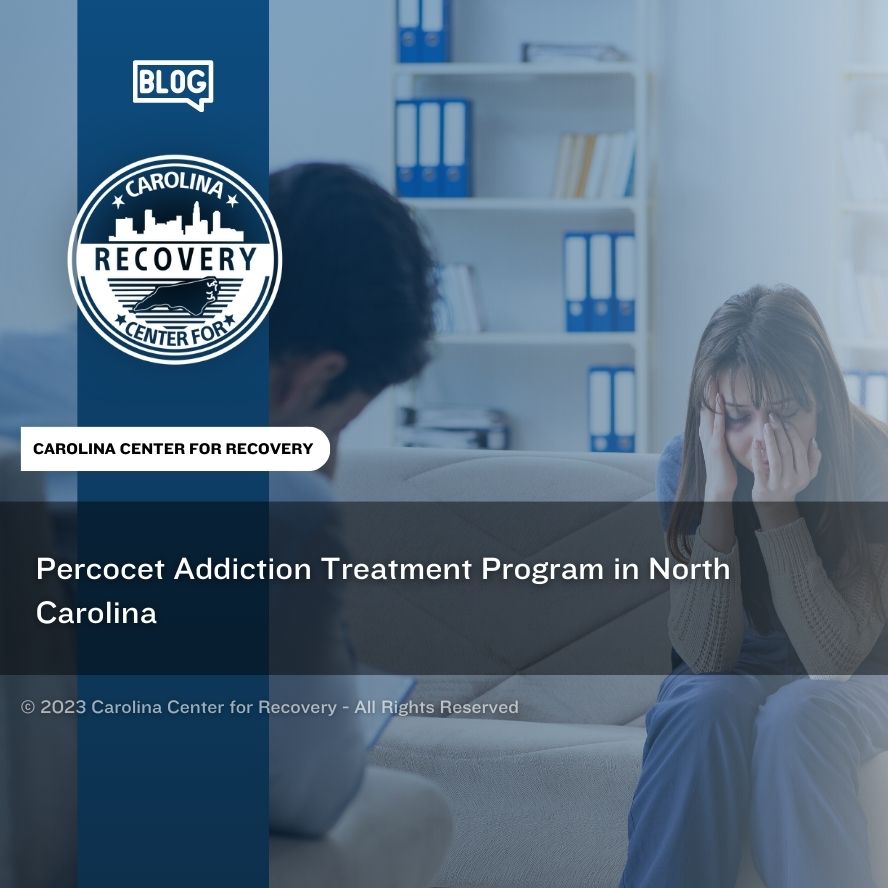Percocet Addiction Treatment Program in North Carolina

Medically Verified: 2/1/24
Medical Reviewer
Chief Editor

All of the information on this page has been reviewed and verified by a certified addiction professional.
An opioid crisis has been building for decades in the United States. According to the Centers for Disease Control (CDC), around 136 people die from an opioid overdose every day.
Prescription opioids fuel the problem when people become addicted to them. Many people take opioids to reduce pain after surgery or during treatment for other medical conditions–and many develop a physical dependence on these addictive pain relievers.
Percocet is a commonly prescribed opioid drug. Anyone who uses opioids, including Percocet, must be aware of the risk of addiction. People who develop an addiction to Percocet must seek treatment as quickly as possible to avoid life-threatening complications.
If you or someone you love abuses Percocet or other opioids, you are not alone. Effective treatment for Percocet addiction is available at the Carolina Center for Recovery. Contact us now to explore your treatment options in North Carolina.
What is Percocet?
Percocet is a powerful prescription painkiller. It contains two active ingredients: oxycodone and acetaminophen. Oxycodone is an opioid, and acetaminophen is the active ingredient in Tylenol.
The combination of medications in Percocet makes it a potent pain reliever. Doctors may prescribe Percocet to patients after they have had surgery. Other people may take it to manage chronic pain or after a severe injury.
Percocet is a highly addictive drug. The Drug Enforcement Agency (DEA) classifies Percocet as a Schedule II drug. This classification means that Percocet has a medical purpose but has a high risk for misuse and addiction.
Doctors often prescribe Percocet and other opioids for only short periods. This can reduce the risk of addiction. However, people may still develop signs of physical dependence, even when taking it exactly as prescribed.
Opioid Abuse and Addiction: An Overview
Percocet is a commonly abused prescription drug. Opioids like Percocet work by binding to receptors in areas of the brain that are related to pleasure, pain control, and emotions.
People who take Percocet experience less pain. They may also experience pleasurable side effects, including euphoria. Euphoria is an intense feeling of pleasure, contentment, and warmth.
People who take Percocet may like the way it makes them feel. They may want to take it differently than prescribed. Percocet misuse includes:
- Taking larger doses of Percocet
- Taking Percocet more often than prescribed
- Taking Percocet for longer than your doctor told you to
- Using Percocet without a prescription
Misusing a prescription drug is a form of substance abuse. People who misuse Percocet may develop tolerance.
Tolerance occurs when your body adjusts to the amount of a drug you’ve been taking. If you develop tolerance, you may need to take more of the drug to get the desired effects.
Ongoing substance abuse can lead to drug addiction. When people are addicted to Percocet, their bodies can’t function unless they take it.
People who develop a substance use disorder or addiction need comprehensive, medically assisted treatment to quit and avoid relapse.
Recognizing Percocet Abuse
The first step toward getting treatment for Percocet abuse or addiction is recognizing you have a problem.
Percocet abuse can cause you to behave or feel differently. You may be able to recognize physical signs of Percocet abuse, including:
- Irritability
- Dizziness
- Chills
- Dilated pupils
- Excessive yawning
- Headache
- Watery eyes
Percocet abuse can also cause significant behavioral changes, including:
- Using more Percocet over time
- Lying about symptoms to get a doctor to give you more Percocet
- “Doctor shopping”–having more than one prescription for Percocet from multiple doctors
- Using Percocet without a prescription
- Neglecting your responsibilities, hobbies, and relationships because of substance abuse
- Having legal or financial trouble because of Percocet abuse
People who become addicted to Percocet or other opioids cannot choose to stop. Opioid abuse changes your body and brain, making it very challenging to stop using these drugs.
Most people with opioid addiction require comprehensive, professional treatment and recovery support.
What Happens During Percocet Addiction Treatment?
Opioid addiction treatment is not a one-size-fits-all process. Before beginning treatment, you will undergo an evaluation to determine which course of treatment you require.
Medical and mental health specialists will develop a tailored treatment plan to meet your needs. Your treatment plan may include:
- Medically-supported detox programs to treat Percocet withdrawal
- Individual counseling and behavioral therapy
- Group therapy
- Family therapy
- Relapse prevention and coping skills education
- Mental health treatment
- Medical care
- Nutrition support, exercise, mindfulness, art therapy, and other holistic therapies
- Aftercare planning and support
You may attend inpatient or outpatient treatment, depending on your specific needs. Your treatment team will continue to evaluate your needs as you recover. They will adjust your treatment plan as needed to ensure you get the right care at every stage of recovery.
If you or someone you love requires treatment for Percocet addiction in North Carolina, contact the Carolina Center for Recovery to learn about your treatment options.
Find Percocet Addiction Treatment in North Carolina
Percocet abuse and addiction can be devastating. Living with an untreated addiction can lead to short and long-term harm to your health and well-being.
If you or someone in your life struggles with opioid abuse, effective drug treatment programs are available at the Carolina Center for Recovery.
Contact our specialists now to learn about our supportive programs or to schedule an intake assessment.

